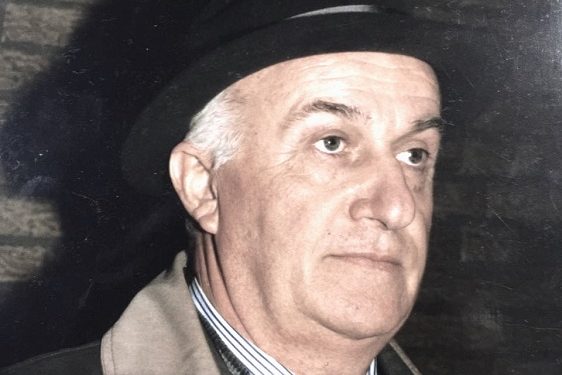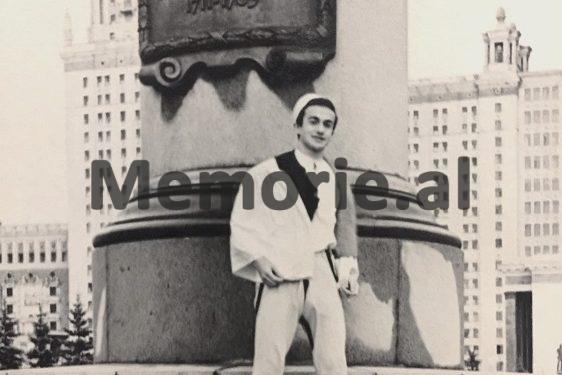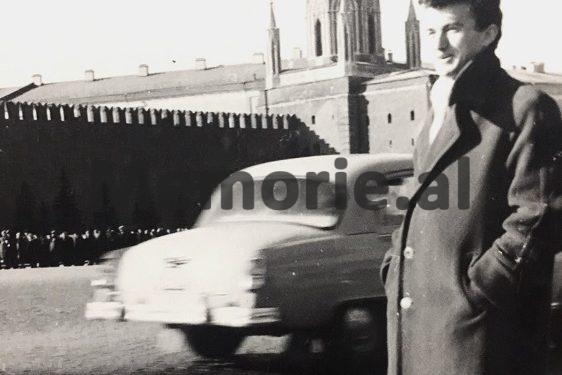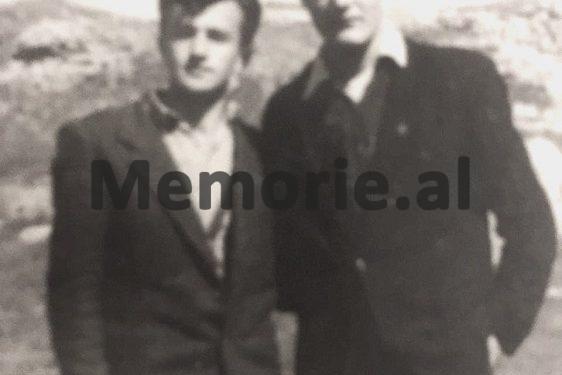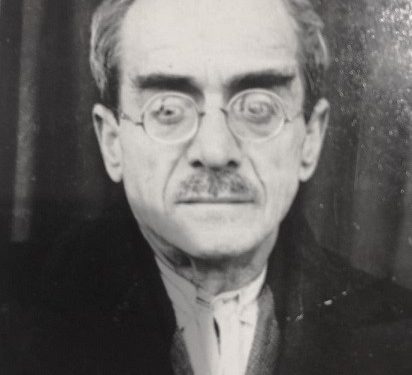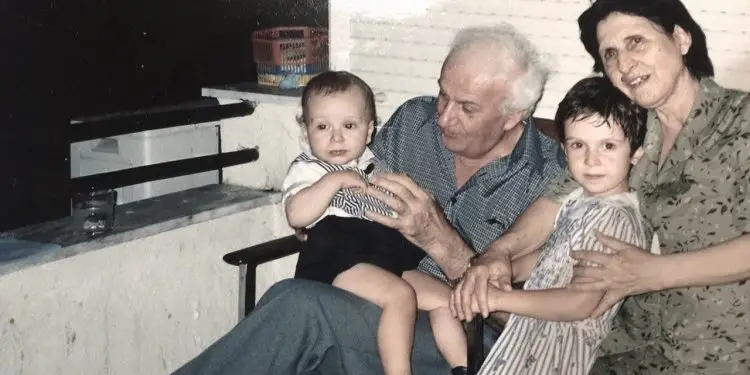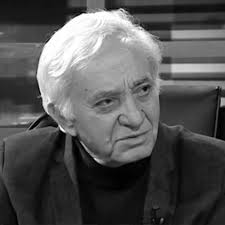From Sokrat Shyti
Part fourteen
Memorie.al / The writer Sokrat Shyti is the “great unknown” who, for several years, has revealed the tip of the iceberg of his literary creativity. I say this based on the limited number of his published books in recent years, primarily the voluminous novel “Nata fantazmë” (Tirana 2014). His novels: “PËRTEJ MISTERIT”, “MES TUNDIMIT DHE VORBULLËS”, “GËRRYERJET E MAKTHIT”, “HIJA E TURPIT DHE E VDEKJES”, “KOLONELI KRYEDHJAK”, “SHPRESAT E NËMURA”, “PËSHTJELLIMET E FATIT” I, II, “MBIJETESA NË KASOLLEN E LOPËS”, as well as other works, all novels ranging from 350 to 550 pages, are in manuscript form waiting to be published. The dreams and initial excitement of the young novelist, returning from studies abroad full of energy and love for art and literature, were cut short early on by the brutal edge of communist dictatorship.
Who is Sokrat Shyti?
Having returned from studies at Moscow State University, right after the rupture of Albanian-Soviet relations in 1960, Sokrat Shyti worked at Radio “Diapazon” (which at that time was located on Kavaja Street), in an editorial office with his journalist friends – Vangjel Lezho and Fadil Kokomani – both later arrested and subsequently executed by the communist regime. Besides the radio, Sokrati, at the age of 21, if we may imagine, had passionate literary interests at that time. He wrote his first novel “Madam doktoresha” and was on the verge of publication, but… alas! Right after the arrest of his friends, to fill the cup, a brother of his, a painter, fled abroad.
Sokrat was arrested in September 1963, and in November of that year, he was sent into internment (together with his mother and younger sister) to a location between Ardenica and Kolonje in Lushnja. For 27 consecutive years, the family lived in a livestock shed made of reeds, without windows, while Sokrat was subjected to forced labor. During these 27 years, he was legally obligated to report three times a day to the regional authority. He had no right to move from the place of internment and was deprived of any kind of documentation, etc. In these conditions, among a livestock shed, he gave birth and raised his children. It was precisely from this event, or rather a very long history of persecution, that he was inspired to write the book “Survival in the Livestock Shed”!
Agron Tufa
Continued from the previous issue
EXCERPT FROM THE BOOK, “SURVIVAL IN THE COW SHED”
–“Therefore, all the rules and definitions will be given orally in Albanian, while on the blackboard, they will be written in Russian, because you are third-grade students and you know how to write and read,” she added.
–“So now, did you understand the translation?” I said, bending my head towards Xhaviti.
–“Perhaps you’re hearing this method for the first time, since your teacher for the first two years was Russian and didn’t know Albanian, so she started and ended her lesson in her mother tongue, without any concern if you didn’t understand,” she emphasized somewhat resentfully.
However, no student accepted her statement. Because when the beauty from Odessa, with that captivating portrait, entered the classroom, she amazed us with her hair like strands of gold and her blue eyes, which mixed the blueness of the sky with the depth of the sea! With that shapely body, like the ballerinas of the “Bolshoi Theatre,” it seemed to us that a fairy had come in, and we held our breath with our gaze fixed on this perfect feminine creature, eager to absorb every word of hers! She had a sweet voice, like honey, and it was warm like a spring breeze! When she spoke with that caressing tone, it felt like she was cuddling and embracing us! We eagerly awaited her lectures like a canary. It seemed as if she recited and sang when she spoke and explained in Russian!
There wasn’t a lesson where we didn’t listen to her masterfully interpret wonderful poems by Pushkin and Lermontov! Our ears, after two years, had overcome the initial difficulties that everyone faces when hearing a foreign language. In a way, she had instilled in us a desire to learn Russian, especially when she practiced speaking through questions and answers, fixing every word with the appropriate accent. For many students, it was a miracle that after finishing the second academic year, with only two classes a week, we could read and understand artistic books!
-“Do you know where the hammer strikes?” Xhaviti whispered to me, so we wouldn’t draw her attention and get scolded. – “She is warning us that Russian will be explained with partisanship…!”
-“In what sense?” I replied without moving my lips.
-“That for these two years, our heads will be filled with slogans and quotes from speeches,” he responded.
-“Accurate definition,” I admitted.
But the long speech of the “peasant teacher,” according to Xhaviti, although it continued until the end of the lesson, did not achieve its goal. Because all the students remained cold, disappointed, and openly showed dissatisfaction that the amazing “fairy” would no longer enter our classroom.
However, despite the interruption of teaching relations, our Russian-speaking group did not sever ties with the mesmerizing beauty. On the contrary, we strengthened them even further to fill the void created by the lessons of Russian, with that preliminary explanation, without substance. The school theater group, under the direction of our “fairy,” continued intensive rehearsals to stage Pushkin’s Rusalka in Russian, the first serious attempt for the director, as an artist and teacher, a wonderful intertwining to showcase her abilities on the stage of the “Migjeni” Theatre, a truly great success that received wide acclaim. – “A beautiful finding to challenge her,” Xhaviti said when I told him about the staging of “Rusalka.”
My progress throughout the educational process maintained the same rhythm as in the first two years. My enlarged photograph, framed in large dimensions, immediately caught the eye as soon as you entered the large hall of the school! Besides this success, which naturally brought me pleasure, I felt happy that my classmates did not respect or like me just for this: they particularly appreciated my tireless willingness and readiness to explain the most difficult lessons and to break down the most complex tasks in physics and mathematics.
They felt proud that their classmate successfully undertook the most challenging and complicated task for such a fragile age, that of the teacher, especially when the students were officers with high ranks, and our professors would be put to a dangerous test. They emphasized from time to time, when the occasion arose, that taking on such a heavy burden saved some professors from facing any punishment with irreparable consequences, considering the terrible general at the head of the Internal Affairs Department, who had launched a fierce cleansing operation against the Catholic Clergy, aiming to subdue it.
Meanwhile, my interest in theater grew day by day. Together with a few boarding school friends, passionate about theater, we created a privileged chance for ourselves: we found a secret passage to sneak into the gallery of the old “Migjeni” theater without being noticed and without damaging the dividing wall between the theater building and our boarding school.
(As an entrance tunnel, a forgotten hole served us, closed from both sides with thick cardboard, which we discovered quite by chance due to the noticeable increase in the sound frequency in this part of the wall. Driven by curiosity, we discovered the “Gibraltar narrow” and, like clandestines, began to watch all the masterpieces of the Great Shakespeare for free, staged successfully and interpreted wonderfully by a brilliant cast of actors!)
Almost at this time, the powerful beginnings of my literary creativity emerged; I wrote sketches and short stories, which I “published” in the school newspaper. These two activities, performance art and literary creativity, placed my desire on two tracks, despite the fact that the direction that would project the continuity of life after finishing high school remained undefined.
Although the conditioning of the future is shaped by coincidences and surprises, I would never have believed that I would be struck by a terrible malicious event at the end of the first semester of my senior year, orchestrated against me by some scheming students with a sinister aim; to deny me the right to receive a scholarship for higher studies, motivated by their fierce ambition to tarnish and devalue the excellent results in my studies and force the Pedagogical Council to strip me of the title “The Pride and Honor of the School”!
No one would believe that a trap filled with vengeful malice could be set from such a simple event: One Wednesday evening, I had taken verbal permission from the dormitory supervisor to watch an Italian film at the city’s cinema, and I was returning from there with impressions of the events on the screen. Suddenly, I was confronted by some shadows in the half-darkness.
At first, I was scared, suspecting wrongdoers. After a few seconds, I distinguished the silhouette of the robust body of the dormitory director, and I realized that a trap had been prepared to hit me at the most sensitive point, breaking the proletarian discipline, which calls for a rather severe punishment.
The next day, the school’s Pedagogical Council convened urgently by the order of the dormitory director. (This right was given by his position as the secretary of the basic organization of the Party). Without considering the opposition of many professors, the school director was forced to announce before all the students lined up in the yard, the terrible decision: “Senior Sokrat Shyti’s conduct grade is being marked down for the violation of proletarian discipline, unauthorized departure from the dormitory for entertainment purposes during mandatory study hours!”
The students’ gazes were fixed on my sorrowful eyes, giving me courage not to fall into despair, trusting that our wonderful professors, led by the director, a magnanimous man with bold vision, would surely find a way to remove the noose of this cruel punishment, which deprived me of the right to apply for a study scholarship.
However, despite their spiritual and moral support, within me, every dreamer’s hope was shattered, so I did not submit a written request for higher studies. The school director urgently called me into his office, gave me a strict warning, and ordered me to quickly submit an application for the three desired branches, accompanied by an autobiography.
Naturally, the months of the second semester of my senior year were filled with gnawing nightmares, until the last day of closing the educational process and the announcement of the final decision by the Pedagogical Council regarding the entry of seniors into state examinations. My classmates and peers from all three senior classes cheered; “Hurray!” when they read my name as a participant in the State Exams! The noose of punishment was lifted! But surprises continued: during the oral math exam, the Minister of Education arrived just at the moment I was to respond! The atmosphere in the classroom electrified.
After clearing his throat (I later learned that this was caused by nervousness), he addressed me in the Lab dialect: – “Forget the thesis responses and solve us some starred problems”! The director signaled to me with his eyes to successfully fulfill this request, smiling slightly, with the subtext that; “Things will go well, so don’t get emotional.” After detailing the three problems on the blackboard (and receiving full approval from the math teacher, who said: well done!), the minister addressed me in an undefined tone:
-“Now listen to me very carefully, boy! The Party is doing you a very great favor: it will send you for higher studies at the most prestigious university in the world, at ‘Lomonosov’ University in Moscow, for you to become a scientist in the Faculty of Chemistry, in the Chemistry-Physics branch! Therefore, it is your duty to repay the Party for this great honor with excellent results…!”
After this statement, he stood up to leave. He exited the examination room with a dignified and authoritative stride, accompanied by the school director and his secretary, leaving me stunned with this surprising and strange announcement that felt like a fantasy! For several minutes, a deep silence settled in the room. The professors, members of the commission, fixed their gaze upon me with questioning looks: How do you feel? Did this sudden decision of the minister make you happy or despairing? … I didn’t even understand how I felt at that moment.
My eyes filled with tears from this surprising turn, which presented me with a staggering, unimaginable reality, forcing me to finally abandon my two dreams, acting and literature, and dedicate my entire life to science! The minister’s order was categorical. This meant that the slightest hint of discontent would bring terrifying consequences for me and my family. Thus, my fate was suddenly predetermined in reverse! I was the only senior in the Lushnje district who knew where I would study, before the Government Commission’s decision was announced!
A month later, I flew to Moscow, a gigantic city entirely unknown to me, the capital of the Socialist Camp, where the soaring dreams of all ages at that time were directed. I had no doubt that most of the first-year students looked at me with envy, as if I were one of those who had touched the sky with their hands. And surely, no one believed that within me, my hopes for the future had been violently shattered, as I still did not even know how events would further unfold…!
To somewhat diminish the extreme poverty of our state in the eyes of our fellow students and to prevent a miserable image from forming among the Russians, we, the boarding school students, were given two pieces of third-quality fabric, which for us were pieces of luxury: one for a large coat, the other for a suit.
Because, apart from the favorites of the “Bloc,” who wore expensive Eastern and Western garments (according to fashion), the first-year students with rural backgrounds stood out in their outdated clothing and appeared quite bewildered, as they were seeing an airplane for the first time and, furthermore, still could not believe that they were traveling by plane to the most developed states of the People’s Democracies!
(Especially when we boarded the ‘TU 104’ airplane, confusion took on disorienting proportions and astonishment transformed into an ephemeral mirage, because we beginners felt like we were experiencing a waking dream, as we had never imagined ourselves to witness such a shocking moment, flying above the white clouds!)
At the gigantic Sheremetyevo airport, the astonished looks of the first-year students became bewildered: it felt like we were inside the setting of an imaginary film! (Minds unaccustomed to such breathtaking sights, projected every second and minute at international airports of world superpowers, find it impossible to grasp and absorb within a short time the myriad of diverse images and fantastic mirages!)
As we traveled by bus to the center for new students, from where the distribution would take place, the Russian fairy tale films I had seen in the cinema flashed before my eyes. But the most shocking and fantastical surprise presented itself when I found myself in front of the giant university, with 34 floors, clad in marble, where 26,000 students studied! (It was said that within the spaces of this giant building, there were so many rooms that a newborn baby would take sixty years to explore them all if it slept every night in each one! And equally strange and fantastic: this giant temple of knowledge was constantly hosting dozens and hundreds of diverse scientific activities of world rank…)
I was placed in the Zh area, designated for students of the Faculty of Chemistry. The luxury and dazzling splendor again brought to my mind the characters from Russian fairy tales. At that moment, it seemed as if I had come specifically to discover the source of the alluring fantasies of writers and fairy tales…! The next day, when I went to the Faculty of Chemistry (a separate building outside the main structure, comparable in size to the University of Tirana), I told myself that I needed to cast aside the hesitations and fears of the grandeur of this giant state, to leave space for my natural abilities to emerge in all directions.
However, the gnawing of the future remained unchanged within me. Because, being actually a student of the Faculty of Chemistry at “Lomonosov” University in Moscow, changing my field of study seemed almost impossible. Nevertheless, spurred on by the advice of some that a change of study could be made even at the embassy (which seemed utopian to me), I gathered the courage to try: I requested a meeting with the ambassador. He listened to me attentively and suggested I not create trouble for myself and my family, explaining that such a request would be viewed in Tirana through the eyes of an opposing stepmother, just like asking for chickpeas in a mill.
“Therefore,” he continued, “instead of raising eyebrows, you’ll end up losing your eyes! Use your mind. Your claim also doesn’t hold for another reason: ‘In life, there are plenty of concrete examples that you can become a writer even after completing studies in a scientific field. For example: the great Anton Chekhov was a doctor. The brilliant Dostoevsky was an engineer. And many others!”
This conversation ultimately convinced me that I had no alternative solutions. Therefore, I began to use my imagination to find a way to showcase my acting abilities. Very quickly, I joined the artistic group of foreign students as a presenter for the artistic program in Russian.
I also became active in the artistic group of Albanian students in Moscow, as a program presenter and dancer in folk dances, under the direction of composers Tonin Harapi, Vath Çangu, and ballet maestro Gëzim Kaceli, who were then students at the “Tchaikovsky” Conservatory. (From the beginning of October until the beginning of December, our artistic group performed in all academies and institutions in Moscow, with our last performance at KNER, in honor of the national holidays, on November 28 and 29).
Dressed in the traditional costume of the Great Highlands, holding our national flag with the proud eagle on a blood-red background, I paraded on a vehicle in “Red Square,” representing the Albanians at the grand celebration of the October Revolution, a unique opportunity where I witnessed firsthand the highest Soviet leadership and the heads of party and governmental delegations from People’s Democracies.
But the most interesting thing happened later, when I was returning. Although I was wearing the traditional costume, I had also put on a large coat to protect myself from the cold autumn temperatures. As I entered the metro to travel pleasantly and warm, I noticed that many curious glances were fixed on me, and camera shutters began to click. Since it was the first time, they were seeing such interesting clothing, they directed curious questions at me: “In which region and in which country is it used? How is it made?” I explained in Russian, as much as I knew, that the men of our Highlands had dressed like this from generation to generation.
In fact, on special occasions, even brave women, like Shote Galica, wore such attire to fight alongside the most distinguished men. Some began to take notes in their notebooks, while the women observed the interesting embroideries carefully. When I exited the metro at the University station, a group of tourists in Luzhniki rushed towards me, capturing photographs. I allowed them to take pictures. They accompanied me joyfully all the way to the central building. And before we said our goodbyes, I asked them to take a photo with my camera too. (Fortunately, these photos can be found in my album!). Memorie.al
To be continued in the next issue
Copyright©“Memorie.al”
All rights to this material are exclusively and irrevocably owned by “Memorie.al”, in accordance with Law No. 35/2016 “On Author’s Rights and Related Rights”. It is strictly prohibited to copy, publish, distribute, or transfer this material without the authorization of “Memorie.al”; otherwise, any violator will be held liable under Article 179 of Law 35/2016




